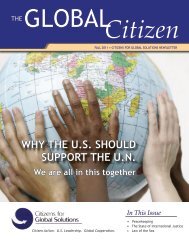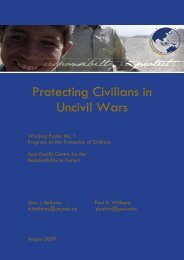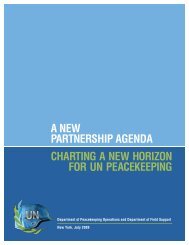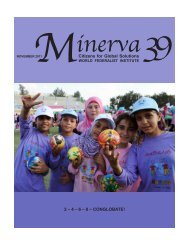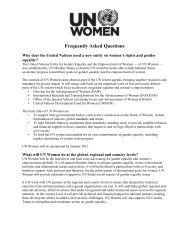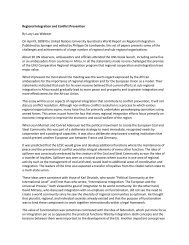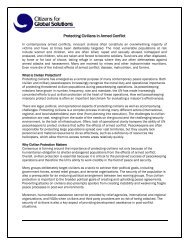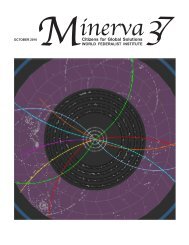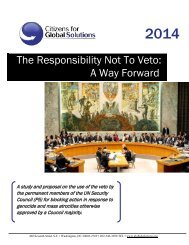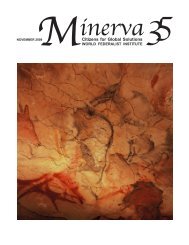Minerva, Spring 2008 (Volume 32) - Citizens for Global Solutions
Minerva, Spring 2008 (Volume 32) - Citizens for Global Solutions
Minerva, Spring 2008 (Volume 32) - Citizens for Global Solutions
Create successful ePaper yourself
Turn your PDF publications into a flip-book with our unique Google optimized e-Paper software.
ing “specific topics related to federalism,<br />
such as the theory and practice of federal<br />
states; multi-level systems of government<br />
and governance; the theory, practice and<br />
re<strong>for</strong>m of international organisations; processes<br />
of regional integration; federalism<br />
as a political idea. The specific policies of<br />
federal polities are not considered other<br />
than as case studies relevant to institutional<br />
and theoretical arguments, strictly<br />
related to federal ideas and structures.”<br />
~<br />
PUBLICATIONS ABOUT ICC<br />
In The Politics of Constructing the International<br />
Criminal Court: NGOs, Discourse,<br />
and Agency (May <strong>2008</strong>), Michael<br />
J. Struett of North Carolina State University<br />
writes: “It should be clear that the<br />
NGOs’ countless written and verbal interventions,<br />
in <strong>for</strong>mal and in<strong>for</strong>mal settings,<br />
decisively shaped the final result on virtually<br />
every provision of the statute. That<br />
outcome can only be explained through<br />
the logical <strong>for</strong>ce of the communicatively<br />
rational arguments put <strong>for</strong>th by NGOs.”<br />
Courting Conflict? Peace, Justice and the<br />
ICC in Africa (March <strong>2008</strong>), by Nicholas<br />
Waddell and Phil Clark, includes essays<br />
by individuals belonging to several CICC<br />
member organizations .<br />
The War Crimes Research Office (WCRO)<br />
at American University’s recent report<br />
(March <strong>2008</strong>), “The Gravity Threshold of<br />
the International Criminal Court”, reviews<br />
“the underlying purpose of the threshold<br />
as understood by the drafters of the Rome<br />
Statute, analyses the application of gravity<br />
in the situations and cases that have<br />
come be<strong>for</strong>e the Court thus far, and offers<br />
recommendations aimed at clarifying<br />
both the objectives of the threshold and<br />
the factors relevant to its satisfaction”<br />
.<br />
In his February <strong>2008</strong> briefing titled “The<br />
Justice Dilemma in Uganda”, United<br />
States Institute of Peace Rule of Law<br />
program adviser Scott Worden provides a<br />
background of the Ugandan conflict and<br />
offers recommendations on how to move<br />
<strong>for</strong>ward with a comprehensive justice<br />
plan .<br />
“Prosecuting Aggression”, Noah Weisbord’s<br />
article in the winter <strong>2008</strong> issue of<br />
the Harvard International Law Journal,<br />
puts the current negotiations on this issue<br />
in the context of past initiatives, begins to<br />
<strong>for</strong>ecast prosecutorial challenges created<br />
by alternative <strong>for</strong>mulations, and identifies<br />
the main prosecutorial challenges common<br />
to all <strong>for</strong>mulations to consider how a<br />
case against a political or military leader<br />
<strong>for</strong> the crime of aggression might look<br />
.<br />
“Puissances et impuissances de la Cour<br />
pénale internationale: des ambiguïtés de<br />
la notion de complémentarité”, an article<br />
by Benjamin Bibas & Emmanuel Chicon<br />
in the French online magazine Mouvements<br />
(13 April <strong>2008</strong> ),<br />
offers<br />
an assessment of the work of the ICC on<br />
the occasion of the tenth anniversary of<br />
the Rome Statute, focusing primarily on<br />
the principle of complementarity.<br />
According to the Coalition <strong>for</strong> the International<br />
Criminal Court, Dr Cenap Çakmak,<br />
in “Civil Society Actors in International<br />
Law and World Politics: Definition, Conceptual<br />
Framework, Problems” (International<br />
Journal of Civil Society Law, January<br />
<strong>2008</strong> ),<br />
explores “the relationship between transnational<br />
civil society organizations and<br />
the rise of a new, participatory, and pluralistic<br />
global governance. Dr Çakmak<br />
uses the CICC as an indicator of this phenomenon,<br />
pointing to the Coalition’s truly<br />
global nature, links with governmental<br />
authorities, and its position as a leading<br />
<strong>for</strong>ce behind adoption of the Rome Statute<br />
and the ICC.”<br />
~<br />
ICC GENDER REPORT CARD<br />
56 • <strong>Minerva</strong> #<strong>32</strong> • June <strong>2008</strong><br />
On 30 November 2007, the Women’s<br />
Initiatives <strong>for</strong> Gender Justice launched<br />
the Gender Report Card on the International<br />
Criminal Court <strong>for</strong> 2007 at the Assembly<br />
of States Parties in New York. It<br />
was the third year that the WIGJ Gender<br />
Justice Gender Report Card provided an<br />
overview and assessment of each of the<br />
situations where the ICC is conducting its<br />
investigations, the charges, major judicial<br />
decisions during the year, the developments<br />
in jurisprudence regarding victims’<br />
participation, and the institutional developments<br />
at the ICC regarding appointments<br />
and policies. The Gender Report<br />
Card 2007 and the speech given at the<br />
launch by the WIGJ Executive Director,<br />
Brigid Inder, are available at .<br />
~<br />
HUMAN TRAFFICKING REPORT<br />
The US Department of State released the<br />
<strong>2008</strong> Trafficking in Persons Report on 4<br />
June <strong>2008</strong>. This eighth annual report, covering<br />
the globe during the period of April<br />
2007 through March <strong>2008</strong>, serves as the<br />
US government’s “primary diplomatic<br />
tool to encourage partnerships and determination”<br />
in counteracting human trafficking.<br />
It may be downloaded at .<br />
~<br />
DRC DOCUMENTARY<br />
In Lisa F. Jackson’s film, “The Greatest<br />
Silence: Rape in the Congo” (Special Jury<br />
Prize, Sundance <strong>2008</strong>), she talks to survivors,<br />
caregivers, law en<strong>for</strong>cement officials,<br />
UN peacekeepers, and some rapists.<br />
~<br />
CHILD SOLDIERS REPORT<br />
The Coalition to Stop the Use of Child<br />
Soldiers issued its first report since 2004<br />
in May. It describes current patterns of<br />
child soldier use, early effects of bringing<br />
perpetrators be<strong>for</strong>e the ICC & the Special<br />
Court <strong>for</strong> Sierra Leone, and major shortcomings<br />
in programs to reintegrate child<br />
combatants. In addition to the important<br />
example of high-level prosecutions, “it is<br />
really important that recruiters face consequences,”<br />
said Coalition Director Victoria<br />
Forbes Adam.



